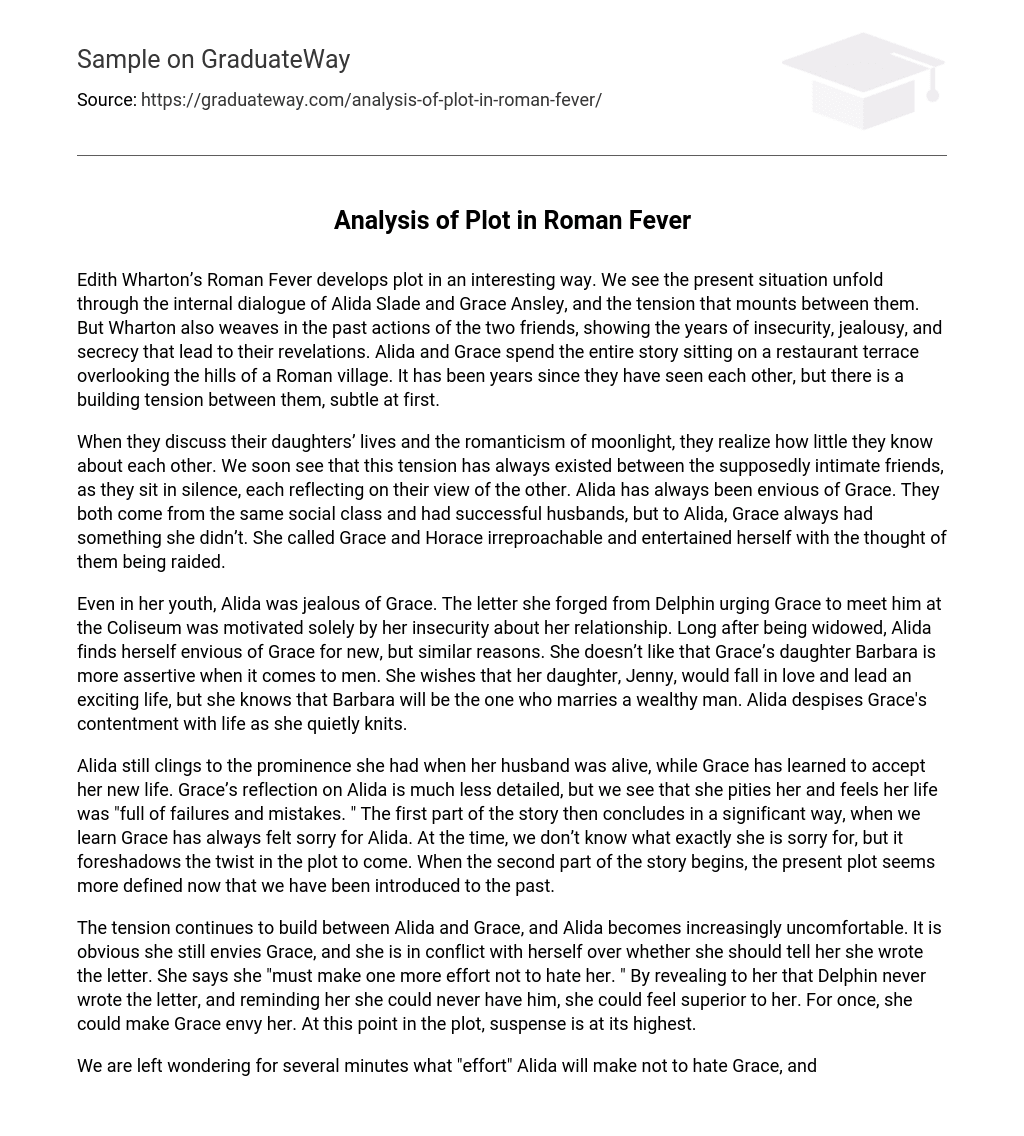Edith Wharton’s Roman Fever explores plot development in a captivating manner. The unfolding of the present situation is showcased through the internal thoughts of Alida Slade and Grace Ansley, as well as the increasing tension between them. However, Wharton skillfully interweaves the past actions of these two friends, illustrating the years of insecurity, jealousy, and secrecy that ultimately lead to their startling revelations. Throughout the entire story, Alida and Grace are seated on a restaurant terrace, gazing at the serene hills of a Roman village. Despite years of separation, an underlying tension steadily grows between them, initially subtle but gradually intensifying.
During their conversation about their daughters and the romantic idea of moonlight, the two friends come to the realization that they have very limited knowledge of each other. This tension between them has been present for a long time, as they now sit in silence, silently contemplating their perceptions of one another. Alida has always harbored feelings of envy towards Grace. Even though they both belong to the same social class and had husbands who were successful, Alida never felt that she had what Grace possessed. Alida would refer to Grace and her husband Horace as perfect and flawless, amusing herself with thoughts of them being raided.
Alida has always been jealous of Grace, even when they were young. The reason she forged a letter from Delphin, urging Grace to meet him at the Coliseum, was because Alida was insecure about her own relationship with Delphin. Even after Alida became a widow, she still feels envious of Grace, but for different reasons now. Alida is unhappy that Grace’s daughter Barbara is more assertive with men, while her own daughter Jenny is not. Alida wishes that Jenny could fall in love and have an exciting life, but she knows that Barbara will be the one to marry a wealthy man. Alida despises how content and calm Grace appears as she quietly knits.
Alida remains prominent after her husband’s death, while Grace has accepted her new life. Grace pities Alida and believes her life was filled with failures and mistakes. The first part of the story concludes as we discover Grace’s sympathy for Alida, hinting at an upcoming plot twist. The second part begins, defining the present plot after learning about the past.
The tension between Alida and Grace intensifies, causing Alida to become increasingly uneasy. It is evident that she still harbors feelings of jealousy towards Grace and is uncertain about whether or not she should admit to writing the letter. She recognizes the need to make an effort in order to prevent herself from hating Grace. However, if she discloses the truth regarding Delphin never authoring the letter and emphasizes his inability to be with Grace, it could elevate her sense of superiority and evoke envy in Grace. This particular point in the narrative marks the pinnacle of suspense.
The anticipation of Alida’s effort to not hate Grace and her retelling of her great-aunt’s story leads to a climax in their strained relationship. Alida eventually can’t handle the tension any longer and confesses the truth to Grace. This pivotal moment in the current storyline is driven by events from the past. Alida believes that revealing the truth will devastate Grace and drastically impact her life. For years, Grace mistakenly believed that a letter was written by him, but in reality, he never wrote it. This revelation is expected to diminish Grace’s happiness, according to Alida’s thoughts.
Grace’s revelation that Delphin responded to her flirtation shocks and devastates Alida. Instead of Alida maintaining her dominant position, Grace takes on a more confident and assertive role. In time, she even suggests that Barbara may be the result of her relationship with Delphin. Although it may seem improbable for the two women to reunite after so many years apart, the significance of the setting cannot be ignored. This place holds deep memories and represents a simpler time for both women, making it unsurprising that they would encounter each other there.
In a different setting, like a circus or the middle of the desert, their meeting would seem more random and unbelievable. However, their history in Rome makes it possible to believe. In fact, the setting pushes the plot to move faster. The views of the Palatine and the Coliseums increase Alida’s jealousy and anger, and the intense tension makes her confess. Wharton successfully includes past events in between present ones to make the climax more captivating.
There is nothing in the story without purpose as all the conversations and emotions shared between the ladies are connected to past events. However, the surprise ending delivered by Grace in the final line of the story leaves us with an uncertain outcome. Grace does not explicitly state that Barbara is her daughter with Delphin, but it suggests the possibility. Throughout many years, Alida prevented herself from fully hating Grace because knowing that Delphin was unattainable for Grace was the one thing that kept her from complete animosity. This lack of resolution leaves us questioning not only the extent of their relationship, but also the consequences it will have on Alida now that she knows the truth.





